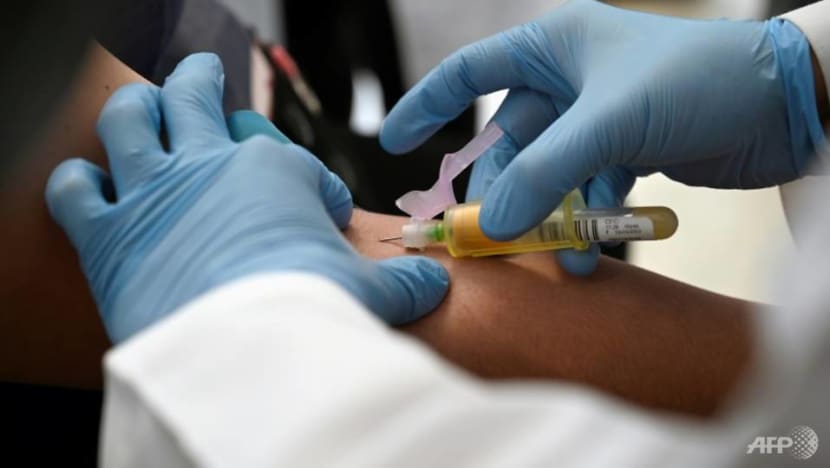Community blueprint launched in bid to end HIV transmission, AIDS in Singapore by 2030

A technician extracts blood from a patient for an HIV test at the specialised Condesa Clinic in Mexico City. (AFP/ALFREDO ESTRELLA)
SINGAPORE: A community blueprint to end the transmission of the human immunodeficiency virus (HIV) and acquired immune deficiency syndrome (AIDS) by 2030 was revealed on Saturday (Nov 23), by non-governmental organisation Action for AIDS Singapore (Afa Singapore).
The blueprint hopes to “end the HIV epidemic by 2030” and was drafted by 60 individuals from various organisations, including activists, medical professionals and academics.
"Singapore is at an important crossroad in the response to the HIV epidemic," Professor Roy Chan, president of Afa Singapore said.
"Many of us working in HIV/AIDS programmes believe that with collective and coordinated actions, we can make a significant and lasting impact on the HIV epidemic in Singapore."
READ: Commentary: Public attitudes of HIV have not moved beyond narratives of fear, prejudice from early years of global epidemic
HIV and AIDS were described as "the most devastating and challenging public health issues in modern times", in the report.
In Singapore, 434 people were reported to have contracted HIV in 2017, and there are total of 7,982 people living with HIV as of that year, the report added.
“Singapore with its small and highly literate population, world class healthcare system and relatively well funded HIV programme is in a good position to join the ranks of cities that can end the HIV epidemic by 2030,” it said.
“The community blueprint is a roadmap on what communities delivering HIV programmes and services feel needs to be done to end HIV in Singapore.”
HETEROSEXUAL MEN THE LARGEST GROUP OF PEOPLE AT RISK
The blueprint identified key groups of people at risk of acquiring and transmitting HIV and sexually transmitted infections (STIs) in Singapore to be men who have sex with men, heterosexual men engaging in casual or paid sex, unregulated sex workers, people who use drugs and transgender people.
READ: 'It's a death sentence': HIV myths debunked
There is an estimated 360,155 high-risk heterosexual men in Singapore – making them the largest group in the blueprint. Some of the issues identified for this group of people were inconsistent condom use and a low uptake of voluntary testing.
As for men who have sex with men, there was a “disproportionate number” affected by HIV. The issues this community is believed to face include low condom use and HIV-related stigma and discrimination within this group.
For transgender people, some of the challenges they face that put them at risk of acquiring HIV include a lack of understanding about their needs, stigma and discrimination towards the community and improper medical resources.
Stigma, inconsistent condom usage and low awareness of HIV prevention were also some of the challenges sex workers face, the blueprint added.
For these various groups of people, the blueprint hopes to “scale up reach and effectiveness of HIV prevention testing and linkage to treatment efforts”.
READ: Why does Singapore need an HIV registry?
STIGMA STILL STANDS IN THE WAY
But stigma, is a key barrier, to both HIV prevention and treatment, Afa Singapore's report said.
“The fear of stigma and discrimination, which can also be linked to fear of violence, has been shown to discourage (persons living with HIV) from disclosing their status even to family members and sexual partners, and undermines their willingness to access and adhere to treatment.”
The report also cited stigma and “poor acceptance” within the healthcare setting and “discriminatory hiring practices”.
“No formal legislation had been enacted to protect (persons living with HIV) against workplace discrimination based on HIV status,” it said.
To overcome these challenges, some of the suggestions in the report include a review of current HIV care service and programmes and policies, normalising HIV testing, tackling discrimination against people living with HIV in the workplace and building sustainable support networks.
“HIV experts are unanimous in their view that though HIV treatment is a critical tool toward sending the AIDS epidemic, it alone will not be enough to prevent new infections.
“While taking action to maximise the prevention effects of HIV treatment, urgent efforts are similarly needed to scale up other core prevention strategies,” it added.














